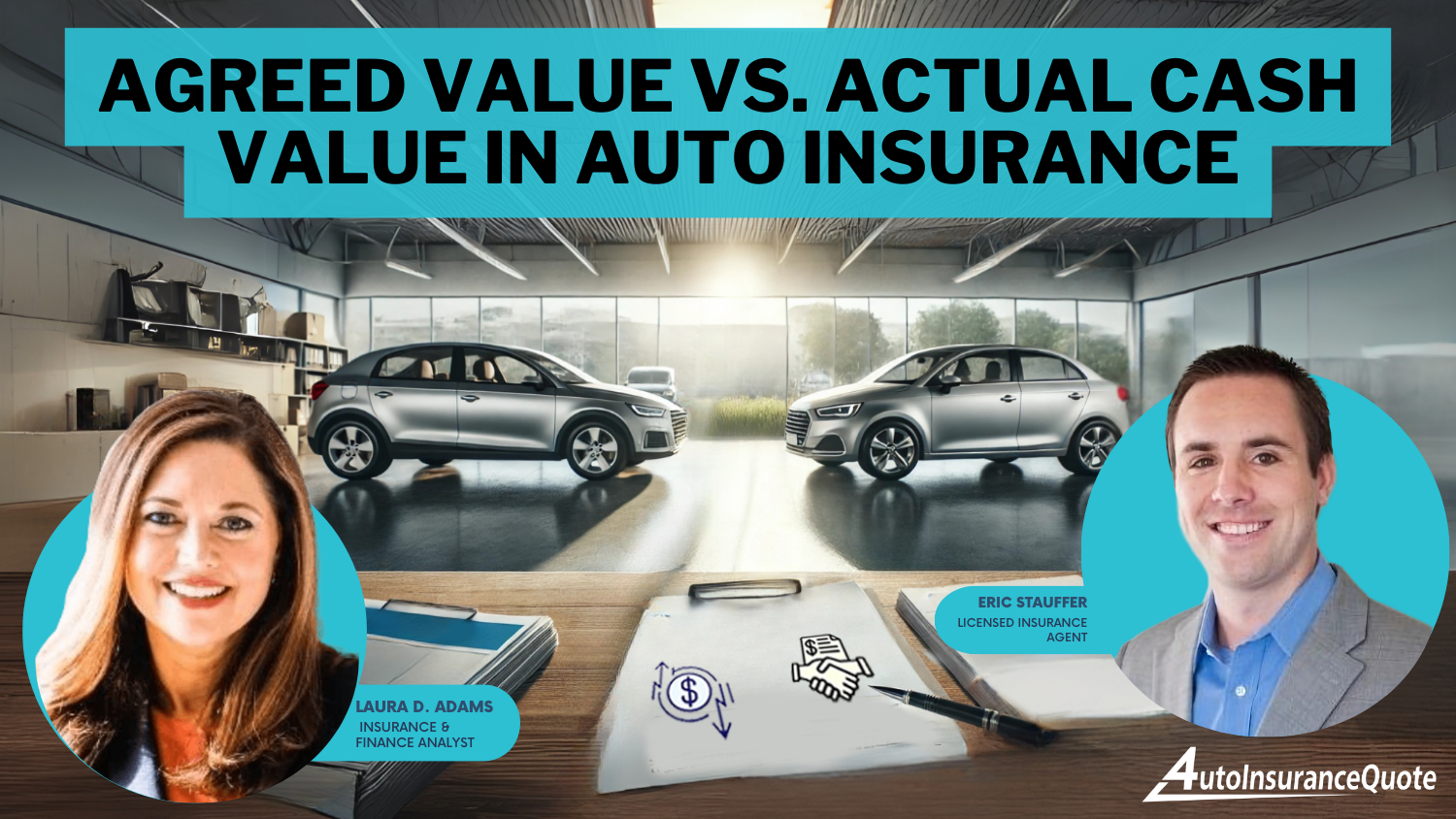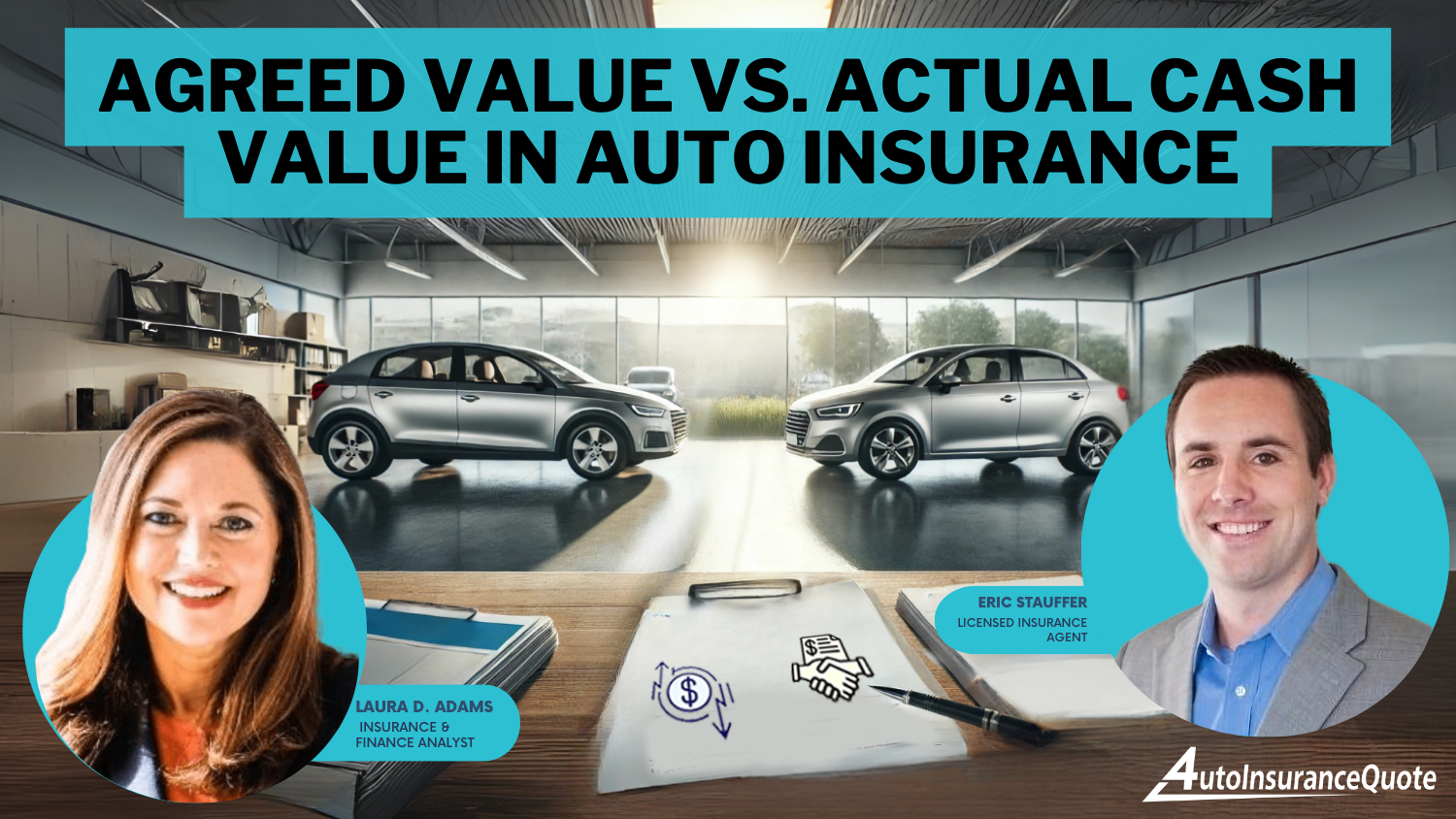What is the difference between agreed value and actual cash value auto insurance coverage?
Confused about the difference between agreed value vs. actual cash value auto insurance coverage? Actual cash value and agreed value insurance each provide a unique set of advantages. Read on to learn the key distinctions between agreed value and actual cash value auto insurance coverage to make the best choice for your needs.

Free Car Insurance Comparison
Compare Quotes From Top Companies and Save
Secured with SHA-256 Encryption
Eric Stauffer
Licensed Insurance Agent
Eric Stauffer is an insurance agent and banker-turned-consumer advocate. His priority is educating individuals and families about the different types of insurance coverage. He is passionate about helping consumers find the best coverage for their budgets and personal needs. Eric is the CEO of C Street Media, a full-service marketing firm and the co-founder of ProperCents.com, a financial educat...
Licensed Insurance Agent
UPDATED: Feb 19, 2025
It’s all about you. We want to help you make the right coverage choices.
Advertiser Disclosure: We strive to help you make confident auto insurance decisions. Comparison shopping should be easy. We are not affiliated with any one auto insurance provider and cannot guarantee quotes from any single provider.
Our insurance industry partnerships don’t influence our content. Our opinions are our own. To compare quotes from many different companies please enter your ZIP code on this page to use the free quote tool. The more quotes you compare, the more chances to save.
Editorial Guidelines: We are a free online resource for anyone interested in learning more about auto insurance. Our goal is to be an objective, third-party resource for everything auto insurance related. We update our site regularly, and all content is reviewed by auto insurance experts.
UPDATED: Feb 19, 2025
It’s all about you. We want to help you make the right coverage choices.
Advertiser Disclosure: We strive to help you make confident auto insurance decisions. Comparison shopping should be easy. We are not affiliated with any one auto insurance provider and cannot guarantee quotes from any single provider.
Our insurance industry partnerships don’t influence our content. Our opinions are our own. To compare quotes from many different companies please enter your ZIP code on this page to use the free quote tool. The more quotes you compare, the more chances to save.
On This Page
Understanding how auto insurance works can be confusing, but we’re here to help. Read on if you’re confused about the difference between agreed value and actual cash value coverage.
We’ll explain the key distinctions between these two types of coverage to help you make the best choice for your car insurance needs.
- Agreed value and actual cash value are two types of auto insurance coverage
- Agreed value coverage sets a predetermined value for your vehicle, while actual cash value coverage takes into account depreciation
- Agreed value coverage may be more expensive, but it offers greater protection for classic or unique vehicles
The Difference Between Agreed Value and Actual Cash Value Auto Insurance Coverage
Understanding the differences between agreed value and actual cash value auto insurance policies is important to protect your car. Agreed value insurance guarantees a set amount of money if your car is stolen or can’t be fixed.
Actual cash value insurance pays you what your car is worth, but that amount goes down as your car ages.
Compare over 200 auto insurance companies at once!
Secured with SHA-256 Encryption
Agreed Value Auto Insurance Coverage
Agreed value auto insurance coverage is a type of coverage that sets a predetermined value for your vehicle. You and your insurance company agree upon this value when you purchase your policy.
In the event of a total loss or theft, your insurance company will reimburse you for the agreed-upon value of your car without any deductions for depreciation.
This type of coverage is often used for classic or unique vehicles that may appreciate over time. However, if you’re asking yourself, “How do auto insurance companies value cars?” you may want to ask about agreed value coverage.
Actual Cash Value Auto Insurance Coverage
Actual cash value auto insurance coverage is a type of coverage that considers the depreciation of your vehicle over time. In the event of a total loss or theft, you will be reimbursed for the actual cash value of your car, which is the cost of your vehicle minus depreciation.
This type of coverage is more commonly used for newer vehicles that are more likely to depreciate over time. (For more information, read our “Vehicle Depreciation and Its Effect on Auto Insurance Rates“).
Which type of coverage is right for you?
The types of auto insurance coverage that are right for you will depend on several factors, including the age and condition of your vehicle, how much you use it, and your budget.
Agreed value coverage may be more expensive than cash value coverage, but it offers greater protection for classic or unique vehicles that may appreciate value over time. On the other hand, actual cash value coverage may be a more cost-effective option for newer vehicles that are more likely to depreciate over time.
When comparing auto insurance policies, it’s important to carefully consider your coverage needs and budget and any discounts that may be available. In addition, bundling policies with the same company or maintaining a good driving record can often lead to lower auto insurance rates.
Read more: What is the difference between primary and secondary auto insurance coverage?
Compare over 200 auto insurance companies at once!
Secured with SHA-256 Encryption
Final Word on Agreed Value vs. Actual Cash Value Auto Insurance Coverage
Understanding the differences between agreed value vs. actual cash value auto insurance coverage is crucial for protecting your vehicle. Agreed value insurance guarantees a predetermined payout if your car is damaged beyond repair or stolen.
On the other hand, actual cash value insurance pays out the car’s current market value minus depreciation.
While agreed value insurance may be more expensive, it can provide peace of mind if you choose insurance for a classic or high-value vehicle. On the other hand, actual cash value insurance may be a more cost-effective option for owners of newer, lower-value vehicles.
Before deciding, carefully evaluate your car’s worth and your budget. By finding auto insurance quotes online and understanding policy terms, you can make an informed decision and ensure you have the coverage you need in case of an accident.
Frequently Asked Questions
What is the difference between agreed value and actual cash value auto insurance coverage?
Agreed value coverage sets a predetermined value for your vehicle, while actual cash value coverage takes into account the depreciation of your vehicle over time.
Is agreed value coverage more expensive than actual cash value coverage?
Agreed value coverage may be more expensive, but it offers greater protection for classic or unique vehicles that may appreciate over time.
What factors should I consider when choosing auto insurance coverage?
When choosing auto insurance coverage, you should consider the age and condition of your vehicle, how much you use it, and your budget.
Compare over 200 auto insurance companies at once!
Secured with SHA-256 Encryption
Eric Stauffer
Licensed Insurance Agent
Eric Stauffer is an insurance agent and banker-turned-consumer advocate. His priority is educating individuals and families about the different types of insurance coverage. He is passionate about helping consumers find the best coverage for their budgets and personal needs. Eric is the CEO of C Street Media, a full-service marketing firm and the co-founder of ProperCents.com, a financial educat...
Licensed Insurance Agent
Editorial Guidelines: We are a free online resource for anyone interested in learning more about auto insurance. Our goal is to be an objective, third-party resource for everything auto insurance related. We update our site regularly, and all content is reviewed by auto insurance experts.
